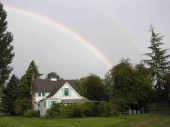The Conservation College Blue Skye Farm Internship is an entrepreneurial, sustainable homesteading program informed by the principles of permaculture that trains participants to be energy efficient and self-sufficient living off the land.
Our certification with the Washington State Farm Internship Project allows us to fill just 3 positions available in this, our 20th Anniversary Year, with one room still available for a couple or single applicant. Apply by April 30th to start May 7th, 2017 on our mini-farm at 1026 14th St SW, Puyallup WA 98731.
Our farm internship training positions are available for adults who want to develop skills of energy conservation and self-sufficiency at our home campus on Blue Skye Farm. You will work to learn homesteading, sustainability and “permaculture” skills which include a revolutionary lifestyle of appropriate living that cultivates the home environment in a way that benefits nature as well as humans.
Skills you will develop include • Farm Animal Care & Cultivation • Organic Fruit Orcharding, Herb & Vegetable Gardening • Sustainable Building • Natural Selection Forestry • Budgeting & Profits from Entrepreneurial Cottage Industry • Wild Edible Foraging & Preparation • Paleo Cooking & Food Storage • Medicinal Herb Collection & Preservation and more.
FAQ – Mission, Participants & Cost
The mission of the internship is to guide you to become a self-sufficient homesteader and an expert on sustainability skills. It is designed for aspiring homesteaders, hobby farmers, permaculturists and budding entrepreneurs want to learn these subjects.
No matter your previous experience, you will be expected to fully participate in every possible training opportunity to push your skills to a higher level of excellence, although your own health will be the priority. We hope that along with your development of a personal medicine wheel of health, guided by permaculture principles, the values of earth skills, and your own self-care and self-motivation, you become a person to whom anyone could turn to in times of need.FAQ – Internship Directors, Dates & Costs
Farm Internship Directors: Kim & Chris Chisholm will be your mentors through this experience, and participants will also receive guidance from veteran staff.
Full Time Tuition with Room & Board: All expenses including tuition, room and board at Blue Skye Farm total $1,950 minus discounts for early work trade and previous experience considered, and you can earn that tuition back with farm sales. Instructor Certification & College Credits may be available for extra fees. There are also other apprenticeship focus options you can choose which vary in required dates and base costs up to $2,950.
2017 Dates: May 7 – September 24 are required full time, and you can extended your stay with complimentary room and board through October. Our certification with the Washington State Farm Internship Project allows us to fill just 3 positions available in this, our 20th Anniversary Year, so apply by April 30th.
FAQ – Farm Internship Benefits & Background
Our apprenticeship programs have run every year since, with the farm internship piloted a couple times over the years until the Washington State Farm Internship Project legislation finally passed in 2015 and we began the program in earnest. More than half our staff have come on board via our apprenticeships and now farm internship, while others enrolled to receive training in advance of starting their own schools or to gain experience for employment elsewhere. Check out our apprenticeship testimonials from novice apprentices, former campers-turned-instructors, and experienced educators who all succeeded in our summer apprenticeships and agree that results far exceeded expectations.
Beyond tuition and insurance, you need not spend another dime all summer, as all additional expenses are covered with work trade. Some might think that not spending any money all summer, and gaining income from farm sales are the bottom line benefits, but the real bottom line is your transformation into an experienced farmer with foundations in small business management. Successful participants also gain eligibility for employment at Wolf Camp and have strong recommendations for employment elsewhere.
FAQ – Work Priorities & Skill Goals
Your goals will expand over the course of the summer, from learning the basics of sustainable farming, to the development of your entrepreneurial skills, to being given teaching opportunities during the summer. Curriculum for the program will include field exercises from the Wolf Journey Earth Conservation Course including Book I: Trail of the Neighborhood Naturalist, Book II: Trail of the Traditional Herbalist and Book VII: Trail of the Sustainable Citizen.
1st Priority: Learn to earn a living by producing, marketing and selling farm produce. The Conservation College will cover expenses like farmer’s market booth fees and city permits for farm stands on the street, so revenues will be split 50/50 on everything you produce and sell from our farm.
2nd Priority: Take care of yourself, while nurturing campers and supporting other staff. It is important that you come into the program as healthy and prepared as possible, for although during the training portion of the program your educational needs are the focus, during the summer camp season, the needs of the children at camp will be the focus, so you will have to learn to remain healthy amongst constant camp activity.
3rd Priority: Develop a working knowledge of the skills. Interns always relate how at the end of the summer, they were amazed at how this “just happened” but on the other hand, with skills like these, it’s all about studying each and every aspect at length.
For more information, call Kim & Chris Chisholm at 425-248-0253 or for all the details and application see
http://www.wolfcollege.com/internships-apprenticeships/full-time-summer-residential-outdoor-education/blue-skye-farm-sustainable-homesteading-entrepreneurial-self-sufficiency-permaculture-program/


